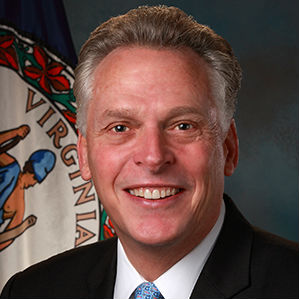
“I am pleased to work with Chairman Chris Jones on a legislative package that puts the taxpayers first, making sure transportation dollars are invested wisely, while addressing critical transportation needs across Virginia,”said Governor McAuliffe. “Strengthening our transportation infrastructure and offering new options for commuters and businesses is a central part of my administration’s effort to build a new Virginia economy.”
“This legislation maximizes limited resources by providing the right funding structure to restore aging roads and bridges and make other critical improvements to Virginia’s transportation network,” said Transportation Secretary Aubrey Layne. “I want to thank Delegate Jones and Delegate Rust for focusing on solutions and sponsoring legislation that improve reliability in how funds are distributed and restore integrity to the P3 program.”
Delegate Chris Jones added, “The changes we are promoting will help get funds to local communities who haven’t seen funds in four years and the legislation will restore integrity to the public private transportation act process and help keep this program effective for key projects in the future.”
The bipartisan legislative package focuses on the following areas:
- Reforming the PPTA process, commonly referred to as the P3 program
- Replacing the old transportation funding formula with a new system that will better meet transportation needs and improve reliability and transparency, and promote HB2 implementation
- Focusing resources on fixing aging bridges and pavement
- Improving oversight of project spending by creating a more independent Commonwealth Transportation Board (CTB) by establishing that the Governor can only terminate CTB members for cause
- Providing stability in the funding stream for transit capital projects
Highway Formula Changes
“Current highway funding formulas do not meet today’s needs,” said Governor McAuliffe. “The outdated formulas result in a lack of funding for local needs, including replacing aging bridges and pavements. The bill greatly simplifies the myriad of rules governing the distribution of transportation funding, which will make funding more reliable and consistent.”
Changes to the formula
- The bill replaces the old 40-30-30 funding system with a new formula. Under the old system, funds were given directly to the localities. Funds were broken up into many small buckets, which took years to build up enough money in one locality to do anything significant. Legislation proposes to change the old formula to the following:
- 40 percent of the money will go to the rehabilitation of structurally deficient bridges and deteriorating pavement.
- 30 percent of funding will go to projects of statewide importance, which will be completed under House Bill Two (HB2). HB2, which Governor McAuliffe signed into law last year, requires the CTB to score projects based on an objective analysis. Once projects are scored, the CTB will then select projects for funding.
- 30 percent will go to a construction district grant program. Under this third category, localities will be able to compete for funds under a regional version of HB2. This will provide an incentive for localities to work together on their transportation projects.
Additional support for transit capital projects
- In total, changes will provide an additional $50 million annually for transit projects (based on FY 2021). Funding will be shifted from the Rail Enhancement Fund, the Port and Aviation shares of the Transportation Trust Fund, as well as multiple highway funding sources.
Making CTB more independent
- The bill also removes the governor’s authority to terminate CTB members without cause in order to improve integrity and independence of the process.
P3 Reforms
“The P3 program works for the right projects, such as the I-95 and I-495 Express Lanes in Northern Virginia where the private sector put their money and resources on the table in expectation of getting a reasonable return on their investment,” said Governor McAuliffe. “The P3 program was the wrong procurement tool to deliver the U.S. 460 project in southeastern Virginia, which cost taxpayers $300 million with nothing to show for it. To prevent this from occurring again, Delegate Jones has played a significant role in reforming this process so it is transparent, the risk to taxpayers is minimized and clear lines of accountability are set.”
Delegate Chris Jones added, “The changes we are promoting will help restore integrity to the public private transportation act process and help keep this program effective for key projects in the future.”
P3 bill highlights:
- Private partners must disclose risk that is transferred to the commonwealth. The intent is to minimize risk for taxpayers by selecting projects in which the private sector is willing to make the appropriate investment in expectation of getting a reasonable return.
- The transportation secretary will be accountable by signing a finding of public interest before a P3 deal is finalized, certifying that the risk transfer and all other findings are still valid. This would prevent situations like the U.S. 460 P3 deal, where procurement changed over the course of the project, yet no one was held accountable. There will be no way to duck responsibility for transportation decisions. The bill will protect taxpayers from undue risk, while using the P3 process in the intended way to deliver projects that move Virginia’s economy.
Representatives from the General Assembly will be on the P3 steering committee that determines whether or not a project should move ahead as a P3 project. They will assess if there is truly a risk and reward relationship between the public and private sectors.










